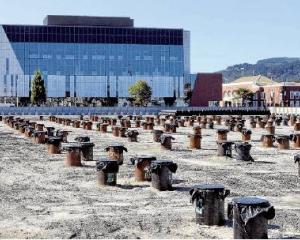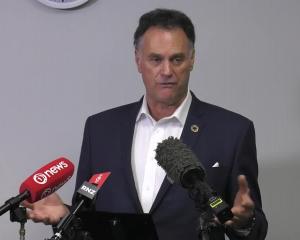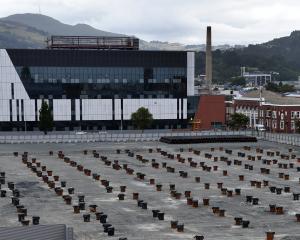
"Ross Home is a canary in a coalmine," National Dunedin list MP Michael Woodhouse said.
"I think this will empower other aged-care facilities that have been struggling on, to say to the Government that enough is enough and we cannot continue to carry the cost of your failure to fund aged care."
Presbyterian Support Otago last week announced a critical lack of staff meant it could no longer keep open its 26-bed Lindsay unit, which houses D6 psychogeriatric residents.
"There is only one place that those people can go, because they can’t go home," Mr Woodhouse said.
"They can only go to the eighth floor of Dunedin Hospital [the older persons’ mental health services ward], which will overwhelm the medical wards, and that will probably happen by next autumn."
Dementia beds in the public hospital are intended for patients whose needs are far greater than residents in facilities such as Ross Home.
Clinicians are understood to be concerned if the Ross Home beds are not replaced lower-level patients with nowhere to go could end up in hospital by default.
Mr Woodhouse said the lack of psychogeriatric beds was not only a concern now but could be a serious issue in the future if any cuts were made to the size and services of the new Dunedin Hospital.
The new facility has a planned capacity of 421 beds, but officials are reconsidering the scale of its inpatient building due to severe stress on its $1.47 billion budget.
Mr Woodhouse said the 421 figure was based on assumptions cuts could be made to admission numbers and lengths of stay.
However, with expected population growth and the ageing population, and now the pending closure of the Ross Home facility, the new hospital would need more beds, not fewer, Mr Woodhouse said.
"To consider cutting any further is, frankly, dangerous."
Health Minister Andrew Little has reiterated if any changes are proposed to be made to the size and services of the new hospital he will need to be consulted first.
In response to a series of written parliamentary questions from Mr Woodhouse, Mr Little confirmed a meeting was held on August 22, at which hospital project and senior health staff discussed the proposed capacity of the new hospital.
"However, no decisions were made at that meeting concerning capacity," Mr Little said.
Mr Little also confirmed that since July 1 Health New Zealand Te Whatu Ora Southern staff had "routinely engaged" with hospital project staff and senior health staff on the configuration and design of the new Dunedin Hospital.
"I am advised that a number of meetings and discussions regularly take place between delivery and health staff to discuss cost control in design of the new Dunedin Hospital," Mr Little said.
"I have not been advised of specific dates, nor is it possible to provide the member with the dates of all the meetings and discussions ... I am further advised that capacity is often part of these conversations," Mr Little said.
He expected that all health project leaders would look at "appropriate steps" to mitigate the risk of cost escalation, and that management of cost escalations was an operational issue for Te Whatu Ora to deal with, Mr Little said.
"It is my expectation that if there is to be any change to scope or services, that I am consulted before any decisions are made," Mr Little said.
Mr Woodhouse said that Te Whatu Ora could not increase the budget for the hospital, responsibility for which rested with the Government.
"That is clearly not within the scope of Mr Little’s thinking right now ... It is either Te Whatu Ora’s to deal with or it’s his to deal with, in which case why would he be consulting with them?
"He is trying to have a dollar each way and avoiding answering the question ... His inability to do so, I think, speaks volumes of the danger facing the people of the South."











